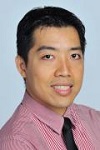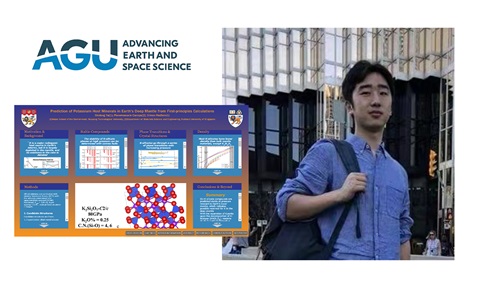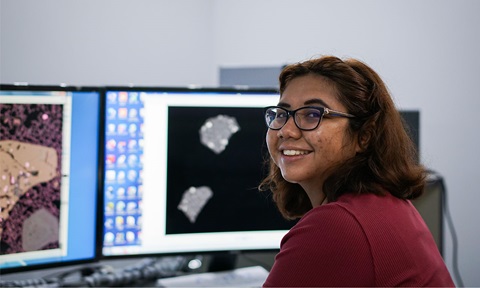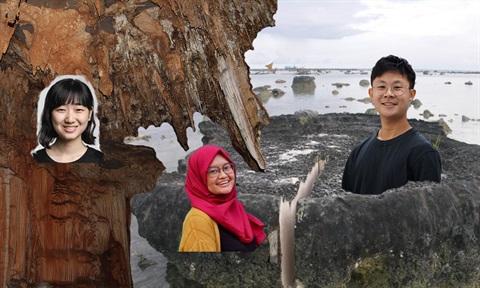What is it like to do a PhD? ASE’s latest PhD graduates share their experience




The ASE has around 40 PhD students, working in a wide range of research areas. This dedicated group, stand behind much of the research that comes out of the school. So far this year, four of them have completed their theses, and successfully defended their work: Riovie Ramos, Yuan Shufang, Yudha Setiawan Djamil and Stephen Chua. Congratulations to you! Originally from the Philippines, China, Indonesia and Singapore respectively, they are representative of the diversity within the school. Here, they share some insights and experiences from doing a PhD at the ASE/EOS, and what lies ahead.
How was it to defend your thesis earlier this year?
Shufang: The defense was quite smooth. I practiced and rehearsed for many times and improved my slides continuously. Afterwards I was happy to hear people from either my field or other research backgrounds that they enjoyed the presentation and the story. The Q/A session was slightly less satisfying as I was not as confident when I answered the questions from experts in my field. But I should have, because I am the one who knows my research the best.
Stephen: It has been a humbling experience. I found that you never really know your work even up to the Oral Defence! In fact, the more you know, the more you know you don’t know, and that’s part of the excitement behind research.
Riovie: Definitely nerve wracking! But there is also a feeling of excitement that finally I’ve come to share my work with peers and defend what I’ve worked hard for in the past 5 years.
Yudha: It was intense up until the end. Comments I received from my committee during the review process helped me improve my work, in the last minute. I found the administration around the defence quite stressful and was thankful for my supervisor’s support with it.
What are the most important things you have learnt during you PhD time?
Riovie: That getting your PhD is only just the beginning. Through this challenging process, we get to know ourselves better- how we learn, how we cope, what works best and what doesn’t, what we value. All of these things prepare us to whatever path we choose in the future.
Shufang: Focus on what you are doing, but also remember that life is much more than that.
Yudha: Troubleshooting, and persistence. I learnt that working in science is also about human relations with the people you work with. I learnt that good planning is important but also that plans can change unexpectedly.
Stephen: The wonderful people I met during this PhD journey, and the opportunity to learn new knowledge and techniques from truly great scientists in my field.
Some highlights from your PhD time?
Stephen: A nice thing about the ASE is the comprehensive range of different topics and themes within a relatively small and ‘cosy’ school. Through interacting with students/faculty members from other topic areas, I learnt a lot and could better put my own work into a bigger context.
Yudha: Figuring out the solution to a problem with my work that I had struggled with for a long time, after a comment from and outside expert. The friendship with other PhD students.
Shufang: a. Several inspiring courses by ASE and EOS professors; b. Helpful discussions with international scientists visiting ASE and EOS; c. The fulfillment that I started from several broken rocks to a wonderful story of climate changes.
Riovie: Getting published was one of the best learning experiences I’ve had during my PhD time. I was able to publish 2 studies before defending and each taught me a great amount of self-discipline, attention to detail, critical thinking and political correctness. And the friendships I’ve made throughout this journey. I know it will be for life :-)
What was challenging? How did you overcome it?
Riovie: It always felt like time wasn’t enough. Juggling between a ton of lab work, data processing, analysis and writing can be very overwhelming. I’m not an expert in time management but I try to focus on one task at a time, day after day, as much as possible. For all I know, all these small steps have already accumulated, leading me to hit that submit button.
Yudha: I encountered a few challenges along the way, and in the end my PhD time was quite different from what I had expected. To some degree I could overcome it by working hard on my own, but no man is an island and you depend on support and expertise from other people.
Stephen: Inevitably, during 5 years of PhD work there will be various unforeseen obstacles and challenges. For example, there was a huge hurdle just obtaining critical geospatial datasets early on, but with much prayer and persistence I was given more data and support than I expected. Working relationships and trust require time to build, but well worth the effort.
Shufang: Writing and presenting my research work like a scientist. Both challenges can be overcome by systematic learning and hard practice. The communication course and some professors (Emma Hill, Pavel Adamek) have been very helpful in improving my communicating and writing skills.
Do you have any advice for PhD students who are just starting up?
Stephen: “Life is like a box of chocolates. You never know what you’re gonna get” – Forrest Gump. Don’t set anything in stone, expect that things will change, like what data is going to be available and how the thesis is going to end. Stay humble and learn when to seek help. You may be keen to show how resourceful you are, but learn to balance it with seeking advice. Finally, read every day, and as broadly as possible and start the literature review as early as you can.
Riovie: Take very good notes. Your future self will thank you for this.
Shufang: a. Make sure that you really like your research topic so that you are self-motivated rather than pushed forward by someone else. b. A problem will meet its solution sooner or later, so no need to worry. c. Enjoy the moment.
Yudha: Make sure you have a good plan to follow, that is continuously revised so that you know what you are doing and when you are doing it. Start focusing on the project that will be your thesis early on.
What happens next for you/what are you doing now?
All four PhD graduates are currently still employed at the ASE, now as research fellows. Stephen is analyzing material from the Kallang River Basin that was not included in his PhD. Yudha is writing up work from his PhD to publish, and applying for new positions. In the future would like to bring the skills he acquired back to his country, Indonesia. Shufang is currently still working in the same research group, mainly to publish her thesis chapters and further collaborate and work on Sulawesi and Vietnam speleothem projects. In the meanwhile, she is also applying for post-doc positions from mainly the United States. Riovie has just taken up a RF position under her former supervisor Dr Nathalie Goodkin for a short period. She plans to publish the remainder of her thesis during this time and perform additional lab work to reconstruct precipitation extending back to the end of the Little Ice Age.
Titles of the interviewees PhD theses
Riovie Ramos: Coral records of the Kuroshio Intrusion across the Luzon Strait: variability and controlling factors
Yuan Shufang - Hydroclimate changes in the Maritime Continent over the past 30,000 years recorded by speleothems from Sulawesi, Indonesia
Yudha Setiawan Djamil: Mid-Holocene climate change over the Maritime Continent: Impact, attribution, and mechanisms
Stephen Chua: Quaternary Palaeoenvironments of the Kallang River Basin, Singapore















/enri-thumbnails/careeropportunities1f0caf1c-a12d-479c-be7c-3c04e085c617.tmb-mega-menu.jpg?Culture=en&sfvrsn=d7261e3b_1)

/cradle-thumbnails/research-capabilities1516d0ba63aa44f0b4ee77a8c05263b2.tmb-mega-menu.jpg?Culture=en&sfvrsn=1bc94f8_1)

7e6fdc03-9018-4d08-9a98-8a21acbc37ba.tmb-mega-menu.jpg?Culture=en&sfvrsn=7deaf618_1)







